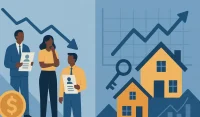American consumers are starting to pull back on spending, according to credit card company Synchrony Financial.
This slowdown comes as inflation pressures continue and economic uncertainty grows.
Max Axler, Synchrony’s chief credit officer, said that spending is down across all income groups.
While most customers are still making loan payments on time, they’re clearly becoming more cautious.
He told Reuters:
“Purchase volumes have gone down across the industry as consumers across all income groups become more thoughtful about spending.”
Synchrony, which partners with retailers to issue credit cards, has over 100 million credit accounts.
The trend it’s seeing mirrors broader economic data.

Debt Rising and Delinquencies Creeping Up
The Federal Reserve recently reported delinquencies are rising in several areas:
- Auto loans
- Credit cards
- Home equity lines of credit
This increase comes as more Americans take on debt while their financial buffers shrink.
Meanwhile, the end of the COVID-era pause on federal student loans is adding pressure.
Student loan delinquencies started showing up again in credit reports from February 2025, and more are expected through May.
Rikard Bandebo, Chief Economist at VantageScore, warned that many consumers will feel the pinch.
“We expect delinquencies to go up… at a time when consumer debt is already high.”
Consumer Confidence Hits Multi-Year Low
In March 2025, US consumer sentiment dropped to its lowest level in over two years. Long-term inflation expectations are now at their highest since 1993.
Retailers like Target and Walmart report that shoppers are:
- Waiting for deals before buying
- Opting for lower-priced items
- Delaying large purchases
This kind of “belt-tightening” could signal more serious trouble ahead, such as:
- Increased credit defaults
- Reduced demand for consumer loans
- Slower bank revenue growth
SBC analyst Saul Martinez. said:
“There is clearly a slowdown, and it shows that the consumer is vulnerable.
What This Means for Employers and Job Seekers
When consumers spend less, businesses in retail, hospitality, and services often respond by:
- Cutting back on staff hours
- Freezing hiring
- Delaying expansion plans
Job seekers in these sectors may face stiffer competition and fewer openings.
Companies May Focus More on Cost Efficiency
Employers may begin prioritizing roles that directly impact profitability or productivity.
This could lead to:
- Increased demand for finance, data analysis, and automation roles
- Reduced hiring for non-essential or support positions
Wage Growth May Flatten
While wages grew strongly in 2023 and 2024, signs point to a potential slowdown in 2025 as businesses adjust to tighter margins.
How Job Seekers Can Adapt
To stay competitive, job seekers should:
- Strengthen financial literacy – Understand how macroeconomic trends affect personal finances and job opportunities.
- Reskill or upskill – Focus on in-demand areas like AI, cybersecurity, and digital marketing.
- Stay flexible – Consider part-time, freelance, or contract roles in sectors still hiring.
- Use targeted job boards – Platforms like WhatJobs.com can help candidates find tailored listings during uncertain times.
Key Takeaways for Employers
For companies navigating this economic landscape, it’s time to:
- Monitor consumer data closely – Spending patterns often predict future demand.
- Evaluate workforce strategy – Focus on roles that drive efficiency or revenue.
- Support employees’ financial well-being – Offer flexible benefits or educational resources to help staff manage rising costs.
- Plan for slow loan growth and credit tightening – Especially in industries reliant on financing or consumer credit.
Looking Ahead: Early Signals of a Shift
The data suggests that while US consumers haven’t stopped spending entirely, they are becoming far more selective. For job seekers and employers alike, this shift may mark the start of a more cautious economic cycle.
As consumer sentiment continues to drop and debt rises, the employment market could enter a new phase—one defined by tighter budgets, slower growth, and a greater emphasis on value.




